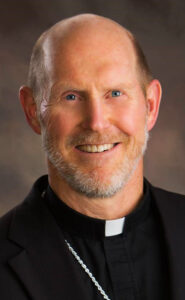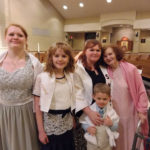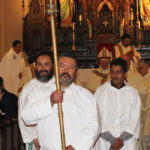By Lindsay Steele
The Catholic Messenger
The U.S. Conference of Catholic Bishops (USCCB) has released a one-page infographic to address misinformation about the role of abortion in women’s healthcare.
Archbishop William E. Lori of Baltimore, chairman of the USCCB Committee on Pro-Life Activities, shared the document with U.S. bishops in an email Sept. 27. He explained that since the U.S. Supreme Court overturned Roe v. Wade on June 24, confusion has arisen regarding legislation brought forth in the states placing limits on abortion. He hopes the infographic helps “clarify the teaching of the Church on the sanctity of human life in light of many of the claims being made in our national conversation. We have done so using very simple language while including footnotes for more detailed explanations.”

The infographic, available as a printable, PDF download on the USCCB website, “addresses common inaccuracies and misconceptions that are presented in the media, which people unfortunately accept as truth and influences their views,” Bishop Thomas Zinkula told The Catholic Messenger.
In general, these misconceptions claim that abortion bans are dangerous to mothers, denying them necessary, life-saving medical treatment, the USCCB website states. The new resource “dispels the many myths which claim restrictions on abortion will limit women’s access to life-saving care.” The USCCB hopes Catholic entities will share the resource to educate Catholics about these “false claims.”
The new document points out the distinction between elective abortion and the loss of a child through miscarriage. “There is a complete moral and legal difference between losing a child through miscarriage and intentionally taking the life of a child,” the document states.
In the case of a miscarriage, surgery may be necessary and is an ethical treatment to remove the remains of an unborn child who has already died, the bishops say. Abortion, however, imposes this procedure on a living child with the intention of ending his or her life.
The USCCB document also mentions ectopic pregnancies, which result when an embryo implants outside the uterus, often in the fallopian tube. “Sadly, such embryos cannot survive and this condition can pose serious risks to the mother,” the document states. While ectopic pregnancies sometimes resolve naturally, interventions are often necessary. When done ethically, treatment for an ectopic pregnancy is not abortion. “Ethical interventions include the removal of the damaged fallopian tube containing the embryo, or if the embryo death has already occurred, medication can be used to resolve the ectopic pregnancy.”
In rare cases, and in the absence of better alternatives, life-threatening maternal health conditions may require interventions that indirectly and unintentionally lead to the death of an unborn child. The USCCB asserts that abortion restrictions “will not prevent women from receiving these treatments.” When the lives of mother and child are both in immediate danger, the goal is to fight to save both patients. “Effective treatments exist that seek to save the life of the mother and never to intentionally harm her unborn child.” When a woman’s life is at risk in pregnancy, preterm delivery may take place as a lifesaving medical intervention to preserve the life of both mother and child.
The Supreme Court’s decision this summer occurred in the process of upholding the Mississippi law prohibiting abortion after 15 weeks, the law at issue in Dobbs v. Jackson Women’s Health Organization.
The High Court ruled that the U.S. Constitution does not provide a fundamental right to abortion, sending the issue back to the states to determine their own abortion laws. Currently, abortion is illegal in Alabama, Arkansas, Idaho, Kentucky, Louisiana, Mississippi, Missouri, North Dakota, Oklahoma, South Dakota, Tennessee, Texas and Wisconsin with limited exceptions. Abortion remains legal in Iowa up to the 20th week of pregnancy.
Read the USCCB document (https://tinyurl.com/276f8hhn) for more information.
Project Rachel Ministry
The new USCCB document clearing up misinformation about abortion includes information about Project Rachel Ministry. Through this resource, the Church offers confidential, compassionate help for those struggling after involvement in an abortion. Deacon Kent Ferris, diocesan director of Social Action, said this helpline remains in place in the Diocese of Davenport. Visit www.hopeafterabortion.org for more information.











